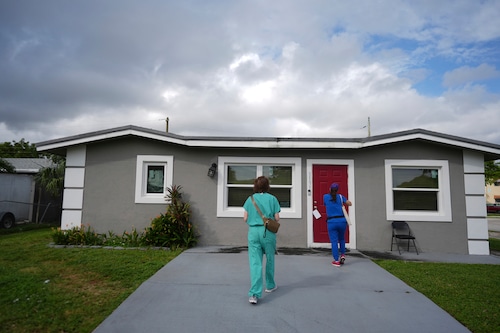To Annie, please:Although I have long enjoyed your column, I thought a recent answer regarding how to handle people knocking on doors lacked some helpful background information.
I’ve done a lot of political outreach work, so I know how annoying uninvited visits can be. Canvassing for elections or other causes, however, is a laborious task, and most people who do it do so with good intentions. Instead of arguing or interfering, the majority are there for a quick, civil discussion. Asking for the name of the group, which is frequently mentioned in the literature they give or leave behind, is something I advise doing right away if someone does act inappropriately.
Additionally, since political and religious canvassers aren’t selling anything, they usually aren’t subject to the no soliciting signs rule. They can even go to places without any soliciting signs and ask for donations in several states. Signs like “don’t knock” or “no politics/religion” are more effective for people who don’t want to be contacted because they are universal.
I make this statement for both homeowners and the ardent people who devote hours to canvassing in order to engage with their communities. There is something wonderful about people devoting their time and energy to their ideas, even if we disagree with their causes. Having your door knocked on may be a minor inconvenience, but it frequently shows how dedicated someone is to their principles. The best course of action if you would prefer not to interact is to open the door, gently request that they not come back, and make a note of their organization’s name in case further action is required.
I appreciate your insightful piece and the way you promote discussions on limits and community. — Not a Lawyer, But an Activist
To the Activist:I appreciate your insightful letter and your nice words. You’ve presented a convincing argument for the need of someone with a strong belief, and I always think it’s vital to weigh both sides of an issue.
To Annie, please:The holidays always make me feel bad. Every year, my husband and I end up going to three Christmas gatherings and at least two Thanksgivings. Even though I like our families, I have a rather low social energy, so attending so many parties in a short amount of time often leaves me feeling exhausted and, to be honest, a little depressed.
In contrast, my spouse excels in social settings. He is typically the last person to want to go and enjoys being at every event from the very beginning. Tension results from this personality difference. When I ask to go early, I usually feel selfish since I’m tired both physically and mentally, and he always looks sad when we have to cut his enjoyment short.
Unfortunately, it is not possible to drive separately and leave at various times for several of these activities because they are far distant.
How do I let my spouse have the time of his life and also maintain my sanity over the holidays? I’m looking for a balance that benefits us both. — Insufficient Social Energy
To the Low Social Battery:It sounds like your hubby is more of an extrovert and you are an introvert. The first step in figuring out how to spend the holidays together is acknowledging this difference.
Consider taking brief breaks for yourself at Thanksgiving and Christmas gatherings. Take a little break to refuel in a peaceful area. This may be going for a little stroll, finding a more peaceful place to sit, or simply allowing yourself to assist with a chore that gives you some alone time.
Setting reasonable expectations in advance with your spouse may also be beneficial. Discuss openly how the parties make you unhappy, then collaborate to come up with a solution that meets your requirements and yours. Decide on a departure time, for instance, or think about switching between staying the entire time at one event and departing early at another.
Maybe you could arrange for him to be involved until the very end while you take a backseat socially—reading, sleeping, or doing something soothing in another room until he’s ready to leave—if driving separately isn’t a possibility.
In the end, compromise is essential. You may both enjoy the holidays without feeling overburdened or let down if you plan beforehand and communicate.
How Can My Partner Who Cheated Be Forgiven? is currently available! Both print and e-book versions of Annie Lane’s second anthology, which includes her favorite pieces on marriage, adultery, communication, and reconciliation, are available. For additional information, go to http://www.creatorspublishing.com. For Annie Lane, send inquiries to [email protected].
Other advice columns
Note: Every piece of content is rigorously reviewed by our team of experienced writers and editors to ensure its accuracy. Our writers use credible sources and adhere to strict fact-checking protocols to verify all claims and data before publication. If an error is identified, we promptly correct it and strive for transparency in all updates, feel free to reach out to us via email. We appreciate your trust and support!

